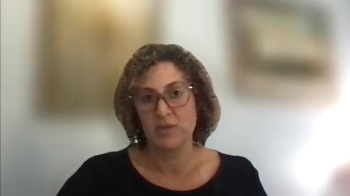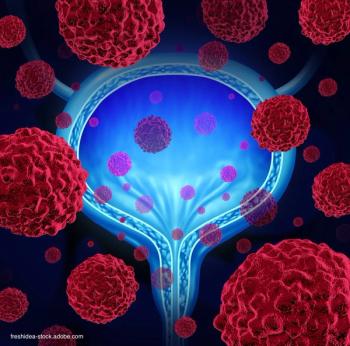
Angela B. Smith, MD, MS, stresses that balancing PROs with traditional clinical end points begins with engaging patients early in the trial design process.

Angela B. Smith, MD, MS, stresses that balancing PROs with traditional clinical end points begins with engaging patients early in the trial design process.

The Continuity Grant will support projects in bladder cancer and/or upper tract urothelial carcinoma that were previously scientifically reviewed, approved, and funded.

"Interestingly, the findings from this study have already translated into an investigator-initiated clinical trial," says John P. Sfakianos, MD.

“It's still relatively early, but this study in close to 1000 patients validated this algorithm, and it's now being studied prospectively as well,” says Yair Lotan, MD.

“There's definitely a lot of hype around the concept of artificial intelligence, and I think we're in the early phases of trying to figure out where it makes sense to adopt the technology and how to incorporate into clinical care,” says Yair Lotan, MD.

"We have now realized that in some patients with a low number of metastatic sites, providing systemic treatment and providing some site-targeted treatment will provide lasting benefit or at least a temporary benefit that will help ameliorate the need for the systemic treatments or very intense systemic treatments," says Armine K. Smith, MD.

In this interview, Yair Lotan, MD, discusses the steps needed for urine biomarkers to be incorporated into standard clinical practice in bladder cancer management.

"It's the first randomized trial that I'm aware of in urine markers looking at standard of care versus a marker-based approach," says Yair Lotan, MD.

“It’s an exciting world in which we have all of these complications about what to do because it means we have a lot more choices for our patients,” said Scott Tagawa, MD.

Yair Lotan, MD, explains how urine biomarker research needs to focus on how these markers can optimally fit into clinical algorithms for bladder cancer.

“I think this is a multidisciplinary approach,” says Monika Joshi, MD, MRCP.

Suzanne Merrill, MD, recaps the BCAN 2023 Think Tank session she co-chaired that covered prehabilitation programs, urinary diversion management, and other focal areas aimed at enhancing the quality of bladder cancer care in the community.

“In many ways the field of urine markers is evolving but it has also hit some obstacles,” says Yair Lotan, MD.

In this interview, Scott Tagawa MD, highlights a session from the BCAN 2023 Think Tank exploring the latest developments in the treatment of patients with advanced urothelial carcinoma.

Awardees are being recognized for creative approaches to accelerating progress in bladder cancer research.

The Bladder Cancer Advocacy Network provides insight into the ongoing cisplatin shortage.

In this episode, Ashish M. Kamat, MD, MBBS, highlights the state of bladder cancer care in recognition of Bladder Cancer Awareness Month.

Outstanding early-career researchers acknowledged for novel studies to enhance the well-being of patients with bladder cancer.

Roger Li, MD, Moffit Cancer Center, was awarded the grant to study the novel oncolytic virus drug CG0070 in patients with intermediate-risk non–muscle-invasive bladder cancer.

First-ever offering will help bladder cancer patients, caregivers and survivors cope with the disease.

Applicants may be working in basic, translational, clinical, epidemiologic, bioengineering sciences or any other field, but projects must be specific to bladder cancer and/or upper tract urothelial carcinoma.

BCAN’s Young Investigator Awards support outstanding early-career scientists and clinical cancer researchers with a demonstrated commitment to improving the understanding and treatment of bladder cancer and/or upper tract urothelial cancer.